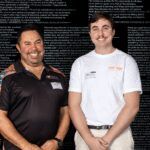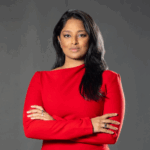Katherine graduating with a BA Education (Early Childhood Education), 2018. Photo supplied by Katherine Pritchard.
Author | Katherine Pritchard
In the 1970s social housing was clustered into specific suburbs, so the poor and rich were separated. Our family was very low income, as were our neighbours. At school, teachers either brought out the best in us or judged our academic capability by our postcode. Their expectations of my family and I were always low.
Mum was a European immigrant and hated school because it meant learning English. Dad was abused by the Christian Brothers who repeatedly told him he was stupid and lacked ability. Neither of them graduated high school.
Because of this, we were taught university was for greedy and materialistic people, and that education for a woman was unnecessary because we were born to have babies and be subservient to a husband. I later discovered as an adult that my European grandfather was an engineer but his qualification was not recognised in Australia, so he became a council shire worker and laid sidewalks in Subiaco. This reinforced the opinion that a university qualification was not an asset or provided any advantage in life.

I have combined ADHD, both hyperactive and inattentive, which was only just diagnosed this year. As a kid, my undiagnosed ADHD frustrated my Mum so much and her parenting style was very authoritarian – both physically and emotionally. I felt unworthy, broken and lazy. I was constantly punished for being fidgety, talkative and experiencing sensory issues. I didn’t speak until I was three. But I was lucky that I loved English and Mathematics so much at school, so I was still able to achieve high grades in those areas.
During the first week of school, my teacher Mrs O’Dea modelled kindness, nurturing behaviour, respect and acceptance.
Mrs O’Dea was frail, old, had kind wrinkles and loved rules. She set me a challenge to learn a big word each week (my first word was ‘curious’). I was encouraged to do something I loved! I fell in love with school and wanted to make her happy because she made me feel important and clever. In that moment, at six years old, I knew I would become a teacher.

Still, there were different expectations for girls and women. During a school trip to the careers centre in Perth, the teachers pointed out a wall of jobs for girls and a wall of jobs for boys. I asked my teacher where I would find the ‘teacher’ career card, and she told me that the people in my suburb were not smart enough for university so I should choose something else. I chose ‘mechanic’. This just made her angrier and she repeated I needed to choose a “girl’s job.” I was encouraged to choose between being a hairdresser, nurse or secretary. I think they assumed I would get married and have babies, so it didn’t matter what I did.
I never let go of my dream and I chose to study a Bachelor of Education (Early Childhood) at Curtin University. I wanted to have the same positive impact on children’s self-esteem that Mrs O’Dea had on me; to let children know that they are worthy, valuable, deserve praise and can learn to embrace their individuality.
University life was difficult. I struggled balancing full-time study with part-time work. My ADHD inattention came back to haunt me, and I used to work in the back corner of every tutorial classroom so I could avoid distractions. I was constantly doubting myself and feeling out of place, particularly as a mature-aged student. But it was support from my husband, children and parents-in-law that saw me through it all. I did it for my husband, our children and our future.
But most of all, I did it to make one child happy – my inner child. I did it for me.
It was during my studies at Curtin that I discovered my true heritage. The University’s core unit on Indigenous Australian Education began a journey of discovery for me. I was working on a research project about Aboriginal and Torres Strait Islander culture when I discovered that my nanna was a Stolen Generations baby and my granddad was born on Yamatji Country. I still don’t know Nanna’s true identity, other than being an East Kimberley baby and that she was taken when she was under 3 years of age.
Today, I am proud to say that I am an Aboriginal woman.


Katherine’s nanna was a Stolen Generations baby and her grandfather was a Yamatji man. “My nanna had a softness and humility, something about her that I have always loved but respect so much more now I am learning her story.” Photos and words supplied by Katherine.
Despite a traumatic childhood in an unhappy home, coming from a low socio-economic status, being neurodivergent and having low expectations placed on me due to my gender, I achieved my dream to be a teacher. I feel even more empowered knowing that I completed my degree before my ADHD diagnosis.
Now, through my own education, I can enact change in education. My passion is to embed Aboriginal and Torres Strait Islander culture in students’ learning environment and across the whole curriculum.
One of my proudest achievements since graduating has been relaunching the Curtin University Early Childhood Alumni Chapter and supporting experienced teachers to do exactly this – embed Aboriginal Culture and Perspectives in the learning environment through workshops.


Through my education, I discovered my inner strength and passion and was able to heal my inner child. I have become a strong advocate for inclusion, social justice, children’s rights and children’s voices being not just heard, but listened to. We need to stop talking at them and start listening to them. I believe the education system should be changed to fit every child, not the other way around.
When I finally stepped onto the stage as a graduate of Curtin, I showed to the world – to women, to Aboriginal people, to mature-aged students, to neurodiverse people and to anyone who struggled with disadvantage and lack of family support – that a university education is possible.

The Chancellor shook my hand, congratulated me and handed me my degree. I thought of Mrs O’Dea, wishing she was there. Because of her, I am empowered to help others, keep learning and advocate for change.
I saw my son standing and cheering me on, and I know that by gaining a tertiary level qualification, I am having a direct and positive impact on my children’s lives. A child born to parents with a higher education is more likely to have a broader vocabulary, access to more books and educational resources, and better educational opportunities. This will influence the rest of their lives.
As a mum, I want my children to have the best opportunities they can. As a teacher, I want that for every child. My own education sets an example for children everywhere to strive for and achieve for their goals.
If I can do it, anyone can.
Author | Katherine Pritchard
___



